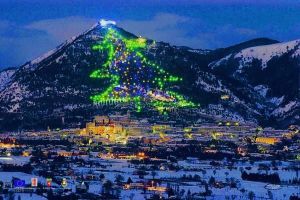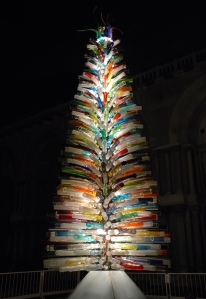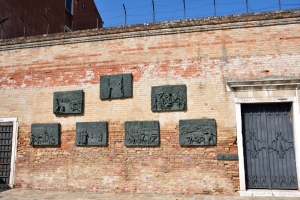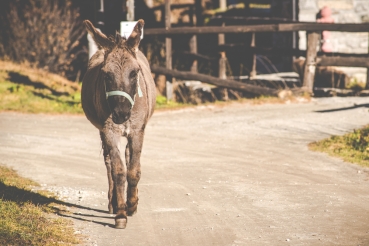A favorite toast amongst Italians at a wedding or at any of life’s happy occasions is “Salute e Cent’anni”. There is a good chance that in Italy you might very well reach 100 years old and possibly more.
Sardinia has the world’s highest recorded percentage of people who have eclipsed a century. In Montemaggiore Belsito, in the province of Palermo in Sicily, celebrating the 100th birthday is a very common occurrence. However, in the town of Acciaroli, in the province of Salerno just south of the Amalfi Coast, with a population of 2,000 inhabitants, 300 persons have reached the age of 100, and 60 of them are pushing 110 and enjoying it.
Is it the Mediterranean diet, wine, olive oil, herbs, fish, climate, location, low-stress, and long walks? The answer is all the above and the Italian way-of-life.
Ernest Hemingway frequently visited Acciaroli, and got inspired to write the “Old Man and the Sea”.
One ingredient in their diet is rosemary, it grows everywhere, it is used to flavor their dishes and its use prevents diseases like Alzheimers, and improves blood flow to the brain. Anchovies, high in Omega 3, are equally effective in preventing heart and cardiovascular diseases. On a recent visit to Cetara, on the Amalfi Coast, just 50 miles north of Acciaroli, I saw the locals placing their catch of anchovies in a small wooden barrel and putting a heavy weight on it. The pressure, over a long period of time, allowed the oils of the fish to drip into a container, which they called “la colatura”. A few drops of this fish oil added to any salad or to any main dish is all you need to get your daily dose of the amazing Omega 3.
It seems that the fountain of youth is in Acciaroli.
I wonder if the 110 year olds still complain that their 85 year old kids are still disrespectful after all these years?
Category Archives: Rosario Mariani
Italian Proberbs
Whenever I go back to Italy and speak to the elders of my small village, they all seem to understand the meaning life better than city-folks. A conversation with a town elder is always followed by a good Italian proverb. The one I liked most and lived-up to it is: “Impara l’arte e mettila d’aparte”. (Learn a trade and set it aside).
This morning, I read a blurb on our good friend Jay Leno, whose paternal ancestor’s came from Flumeri, a small town in the Province of Avellino, who said that he did not spend a penny of his salary from “The Tonight Show”, instead he made a good living from the money he earned from his stand-up routines. He explained that throughout his life he always had at least two jobs. He said that as a young man he worked at a Ford dealership and made extra money by holding on to another job at McDonald’s. He would spend the money from one job while saving the money from the other. He kept this philosophy throughout out his life, and now enjoys the fruits of his hard work and smart thinking. Now all the money he saved went to the work he enjoys most by collecting vintage cars. “Jay Leno’s Garage” is a success!
I’m certain that if Jay Leno were to return to Flumeri for a visit, an elder from the town would listen to him and say: “a un Buon Cavallo non manca Sella”. (There is always a saddle waiting for a good horse).
Italian proverbs are short but have enduring meanings!
Population Growth
China has ended the “One-Child” policy put in place in 1970s to ensure that the fruits of economic growth were not going to be devoured by the out of control population explosion. Nevertheless, the population continued to grow and it’s now about to slow down dramatically. The Chinese officials, by decree, have changed their policy to accommodate their economic and demographic policy.
The Europeans, the Italians in particular, have been facing low birth rates for quite a while now and Italy, along with Germany, is facing the lowest birth rate in Europe. What‘s worse is an aging population that is living longer and receiving generous social security benefits, further straining Italy’s economic resources. In this economic downturn the up-and-coming generation will have difficulty finding work and, when they do at a much later age, their contributions will not be sufficient to sustain the costs for the pensions for the older folks. The “20 something” Italians are very educated these days and they are taking matters into their own hands. Many are moving to wealthier countries to make a living and some will never repatriate. Indeed this brain-drain will be a big loss to Italy in the future. Italy needs workers for their manufacturing companies and, therefore, their open-door immigration policy is a stop-gap to combat the low chronic birth rate. This approach, if managed correctly and efficiently, will help but it may take one or two generations before making any noticeable improvements.
Should we encourage Italian couples to have more children? Don’t forget, Italy has lost over 26 million of its citizens to immigration in the past century. Maybe the government should learn from the Chinese and offer tax incentives for young couples to have numerous children and making it affordable to raise larger families.
The last time Italy gave incentives to push for a population growth was during the fascist regime, when it needed to grow the numbers so that it could populate its African colonies. Families with 5 or more children were quite common during the 1930’s. My grandparents and siblings came to America instead of Africa, so that I could have the privilege to live the American Dream!
The Ghetto
To many, the “ghetto” is part of the city in which members of a minority group live. The term, however, was originally coined in Venice to describe the section of the city to which the Jews were restricted and segregated.
It all started towards the end of the 15th century when many Jews in Spain were given a choice to either convert to Christianity or be expelled from the Iberian peninsula. Many went to Rome, since they were welcomed by Pope Alexander VI, while those who went onto Venice, the authorities decided to confine them and the other Jews to a particular area known as “il borghetto” – better known to us today as the “ghetto.”
During this same time period, the Spanish monarchy confiscated all the wealth of the Jews being expelled and used these funds to finance Christopher Columbus’ voyage to the New World. Nevertheless, the ghetto, ultimately, made its way to the New World as well.
With the wave of immigrants to North America in the 19th and 20th centuries, the new ethnic ghetto areas included the lower east side of Manhattan, New York, which later became notably Jewish. The Little Italys, across the US, became the Italian ghettos. The Polish moved to the Pilsen section in Chicago and Polish Hill of Pittsburgh.
The Russians and the Ukrainians moved to Brighton Beach and renamed it the Little Odessa. New ghettos are springing up all over as new immigrant groups enter the USA. Most often, the old groups move out and up, and make room for the new folks coming from many developing countries all over the world.
 Today, the original Ghetto in Venice is the center of Jewish life in the city. The community counts for about 500 persons and there is also a yeshiva, a synagogue, a museum and several Judaica shops. Many Italian Jews return to the ghetto for religious services and tourists are taken there on daily excursions.
Today, the original Ghetto in Venice is the center of Jewish life in the city. The community counts for about 500 persons and there is also a yeshiva, a synagogue, a museum and several Judaica shops. Many Italian Jews return to the ghetto for religious services and tourists are taken there on daily excursions.
In New York, the Italian ghettos have shrunk to just a block or two, with stores selling  Italian goodies not normally found in other parts of the city. On my recent visit to Arthur Avenue in the Bronx, the owner of a confectionary store confided that 80% of her sales are to persons like myself, from suburbia, who come down to the Bronx in search of the past. This too will disappear as more sales are being done on the web sites.
Italian goodies not normally found in other parts of the city. On my recent visit to Arthur Avenue in the Bronx, the owner of a confectionary store confided that 80% of her sales are to persons like myself, from suburbia, who come down to the Bronx in search of the past. This too will disappear as more sales are being done on the web sites.
Che peccato!
Il Panettone
As an Italian or Italian American, you can’t celebrate Christmas without sharing a Panettone with your family and friends. Whether you choose to eat it at the end of “il Cenone di Natale”, with espresso or cappuccino in the morning, or simply having a slice with your favorite liqueur, it puts you in the holiday spirit. It is uniquely Italian and a tradition that is spreading throughout the whole world.

The Panettone was created in Milan at the time of Lodovico il Moro, 1452 -1508, and it is still produced in the city by bakers and confectioners according to the traditional recipe. One of the most popular legends of its origin is that a cook at the court had to prepare a sumptuous Christmas dinner to which many aristocrats were invited, but the cake, forgotten in the oven, burned.
On seeing the desperation of the cook, Toni, a young kitchen boy, proposed a solution: “With the leftovers in the pantry – a little flour, butter, egg, lime zest and some raisins – made this cake. The cook told him, after seeing the cake, if we have nothing else you can bring it to the table.
The guests were all excited by the dessert and the Duke, who wanted to know the name of that delicacy, asked the chef, who revealed the secret: This is “Pan di Toni” (Tony’s bread) = Panettone.
Since then, many variations of the recipe were created but the original bread pastry with candied fruits and raisin is the only version that counts.
A Partridge in a Pear Tree
The “Twelve Days of Christmas” carol that has always baffled everyone. What in the world do leaping lords, French hens, swimming swans, and especially the partridge who won’t come out of the pear tree have to do with Christmas? Here’s why!
From 1558 until 1829, Roman Catholics in England were not permitted to practice their faith openly. Someone during that era wrote this carol as a catechism song for young Catholics. It has two levels of meaning: the surface meaning plus a hidden meaning known only to members of their church. Each element in the carol has a code word for a religious reality the children could remember.
-The partridge in a pear tree was Jesus Christ.
-Two turtle doves were the Old and New Testaments.
-Three French hens stood for faith, hope and love.-
-Four calling birds were the four gospels of Matthew, Mark, Luke & John.
-Five golden rings recalled the Torah or Law, the first five books of the Old Testament.
-Six geese a-laying stood for the six days of creation.
-Seven swans a-swimming represented the sevenfold gifts of the Holy Spirit–Prophesy, Serving, Teaching, Exhortation, Contribution, Leadership, and Mercy.
-Eight maids a-milking were the eight beatitudes.
-Nine ladies dancing were the nine fruits of the Holy Spirit–Love, Joy, Peace, Patience, Kindness, Goodness, Faithfulness, Gentleness, and Self Control.
-Ten lords a-leaping were the ten commandments.
-Eleven pipers piping stood for the eleven faithful disciples.
-Twelve drummers drumming symbolized the twelve points of belief in the Apostles’ Creed.
Christmas Trees in Italy
The world’s largest Christmas tree display rises up the slopes of Monte Ingino outside of  Gubbio, in Italy ‘s Umbria region. Composed of about 500 lights connected by 40,000 feet of wire, the ‘tree’ is a modern marvel for an ancient city.
Gubbio, in Italy ‘s Umbria region. Composed of about 500 lights connected by 40,000 feet of wire, the ‘tree’ is a modern marvel for an ancient city.

Venice’s Murano Island, renowned throughout the world for its quality glass-work, is home to the tallest glass tree in the world. Sculpted by master glass blower Simone Cenedese, the artistic Christmas tree is a modern reflection of the holiday season.
The Vatican ‘s heavenly evergreen, St. Peter’s Square in Rome hosts a larger-than-life nativity scene in front of the obelisk.
Italian Proverbs
Italian parents and grandparents were always there to guide us. Inevitably they always summed up their philosophy of life with a good Italian proverb. Here are the top Italian proverbs to guide your through 2016 and start your new year off right:
“A ogni uccello il suo nido è bello” – There’s no place like home.
“La filosofia è quella con la quale or senza la quale la vita segue tale è quale”. – No matter what others believe in, live your life your way.
“Acqua passata non macina più.” – It’s water under the bridge.
“O sta minestra, o sta finestra.” – Take it or leave it.
“La gatta frettolosa fa i gattini ciechi.” – Haste makes waste.
“Far d’una mosca un elefante.” – Don’t make a mountain out of a molehill.
“A chi dai il ditto si prende anche il braccio” – Give them a finger and they’ll take an arm.
“L’abito non fa il monaco” – The habit doesn’t make the monk.
“Al bisogno si conosce l’amico.” – A friend in need is a friend indeed.
“Batti il ferro quando è caldo.” – Strike while the iron is hot.
“Cane che abbaia non morde.” – Barking dogs seldom bite.
“Chi cerca trova” – Seek and ye shall find.
“Chi fa da se fa per tre.” – If you want to do it right, do it yourself.
“Chi trova un amico, trova un tesoro.” – Finding a friend is like finding a treasure.
“Padrone sono io, ma chi comanda è mia moglie.” – I’m the boss but my wife is in charge.
A moment in history….
In the late 1950’s and early 1960’s, the Italian economy was booming with a growth rate of around 6.2% per year. Today, many look back and wish they could enjoy such a strong economy again. This rapid growth was sustained by ambitious Italian businessmen opening up new industries in hydrocarbons, manufacturing, reconstruction and the modernization of many Italian cities such as Milan, Turin and Rome. The Marshall Plan was also very effective in jump-starting this amazing post-war economic growth for Italy.
Big Italian cities attracted many workers from villages throughout Italy and by the mid 60’s the small towns became even smaller. Despite the loss of inhabitants, small towns also benefited from the economic boom as well.
The mayor touched by the story kept a donkey’s trail intact for a few years until the donkey passed away and a short time after the old man passed-on too. It was an end of an era.
In 1957, FIAT launched “La Nuova 500” and later the 500 Giardiniera and the Vespa Company introduced the APE along with new motorized farming machines. Now the contadini, were mobilized and could reach their campagne on the outskirts of the villages much faster. They became more productive and enjoyed a new prosperity.
Many villages were able to secure funds from the government to rebuild their infrastructures which brought new life to small and remote areas. Unfortunately, some older folks did not accept all the changes and modernity and wanted to hold on to their traditions by using their mules and donkeys to aid them with their farming chores. By 70’s only a few donkeys remained.
A die-hard old man decided to complain to city hall that the modernization of the town made it difficult for him to lead his donkey through the town, especially that the old, hilly passages were laid with smooth and slippery pavers. He wanted the town mayor to preserve certain trails to accommodate the needs of the folks who still kept to their old ways. The mayor replied sarcastically by saying that he was probably the last individual defending a dumb animal like a donkey and it was time to change.
The offended farmer replied. “How dare you refer to my donkey as a dumb animal! You should be aware that when I served in the Italian army during the 1935 Ethiopian Campaign, our military engineers had to build roads in the colonies but had no time to do any surveys needed to build proper structures. Consequently, the engineers relied on the donkey’s trails to build the roads in a timely fashion. You see, donkeys always take the road of least resistance when climbing up hills. By relying on the donkey’s natural instincts the engineers built great roads in Africa from the donkeys trails and gained valuable time.”
Lost in Translation
When traveling abroad always keep in mind that the locals do their utmost to communicate with the visitors. However, at times their literal translations distort the intended meaning. Here are some signs translated into English:
- “Please use escalator on your behind.”
- “Customers who find our waitresses rude ought to see the manager.”
- “Open seven days a week, and weekends too.”
- “This hotel is renowned for its peace and solitude. In fact, crowds from allover the world flock here to enjoy its solitude.”
- “In case of fire, do your utmost to alarm the hotel porter.”
- “The lift is being fixed for the next day. During that time we regret that you will be unbearable.”
- In a Rome laundromat: “Ladies, please leave your clothes here and spend the rest of the afternoon having a good time.”
- “Do not run on the stairs – use handrail”
- In a department store: “Dresses for street walking”
- “Our stockings cost more but they are much better on the long run.”
- At a hotel reception desk: “Please leave your values at the front desk.”


